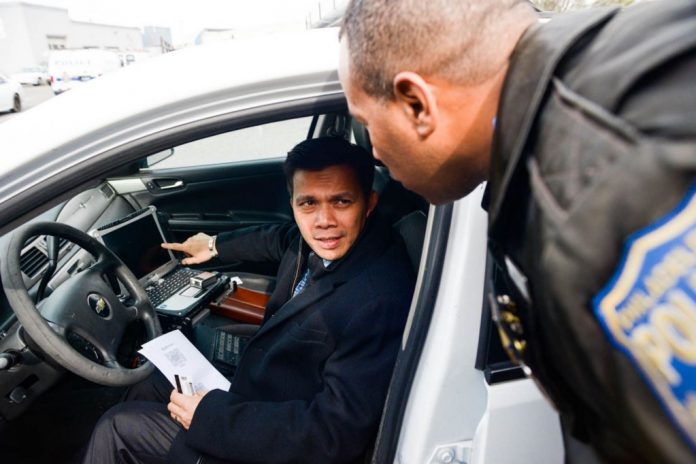IT Project Manager Bernard Garcia (left) helps police officer from the seventh district, Kelvin Carroll, with the new liscence scanners installed in patrol cars. (Maria Pouchnikova)
Equipment similar to the scanners supermarket cashiers use to speed shoppers through checkout lines is being tested by 7th Police District officers to cut the time it takes to write traffic citations.
Small hand-held devices attached to the computers already installed in patrol cars are being used to scan the codes on the back of driver’s licenses and feed the information directly into those computers.
Using the scanner cuts the time the officer would take to type the information into the system, said the 7th district’s commander, Capt. Joseph Zaffino.
The practicality of the device is obvious, he said. An officer can issue a citation and get back on patrol faster than he would if he had to write a ticket longhand. However, the equipment’s expense was another thing in a city that’s been watching its pennies.
“I never thought the city would go for such a program,” the captain said during an interview at district headquarters at Bustleton Avenue and Bowler Street.
However, a 7th district sergeant came up with the idea and found the money to pay for it, he said.
Zaffino said Sgt. Jeff Hickson suggested trying the driver’s license scanner, an idea the captain initially thought was a little crazy. Such equipment was bound to be very, very expensive, he had thought.
But Hickson found some state grant money to pay for high-tech gear, and now a dozen 7th district patrol cars are equipped with it, Zaffino said. Almost all the district’s officers have been trained to use it.
The driver’s license scanner is not being used elsewhere in the city, he added.
“There’s no talk of it be taken citywide,” he said.
The scanners only are being tested right now, the captain emphasized.
“We’re still in a learning phase,” Zaffino said. “A lot of bugs have to be worked out.”
Bernard Garcia, the police department’s IT project manager, is the guy who is tracking down those bugs and working them out. Right now, he said, it will recognize driver’s license codes from every state and Canadian province.
The scanner is about as big as a computer mouse. It reads the code bar on the back of a driver’s license, and the information almost immediately appears on a patrol car’s Mobile Data Terminal. Previously, that information would have to be entered by an officer, who still has to put in some information, including the violation and the location, Zaffino said.
Although Pennsylvania car registration cards have codes that can be scanned, the device in the district’s cars can’t read them yet. The officer has to enter insurance information, too.
The officer also can use driver’s license information along with software already in his patrol car’s computer to check to see if the motorist is wanted. A small printer about the size of an aerosol can prints out the citation.
Once officers get accustomed to the equipment, it’s expected to cut ticket-writing time by several minutes, the captain said, adding that the extra time can be used to patrol.
“This will free us up and give us time to curb burglaries and decrease theft from autos,” the captain said.
The system is still very new. Officer Kelvin Carroll has been using the equipment for a few weeks and said he has noticed no time savings yet.
Garcia believes the scanner eventually should shave four to six minutes off ticket-writing time.
“The district is so fortunate,” he said.
Besides, there already is some time saving at the end of a shift, he added.
The citation that is printed in the patrol car has only one copy, which is given to the motorist. When an officer hits send on his computer, the ticket goes directly to Philadelphia Traffic Court, Zaffino said. Previously, at the end of a shift, hand-written tickets had to be turned in and then sent on to traffic court. That involves some hours of work. By using the scanner, an officer is done with a ticket once he sends it.
Officers still have to fill out their incident reports for car stops, and Carroll said that still takes time.
Also, Zaffino said, some motorists have no driver’s licenses to scan, which mean officers will have to keep a supply of those old-fashioned paper tickets.
Garcia said New York, Florida, Maryland and 11 other states currently use equipment like that being tested in the 7th district. ••
Reporter John Loftus can be reached at 215–354–3110 or [email protected]





